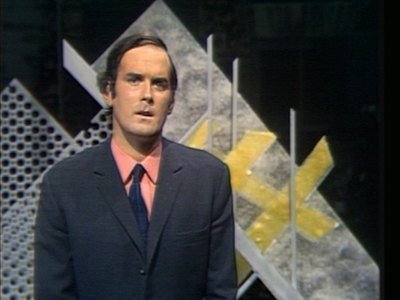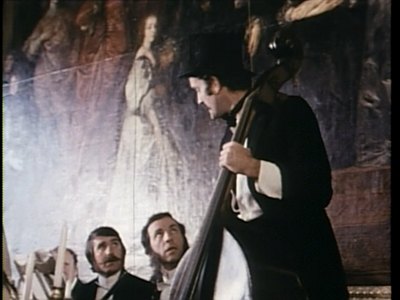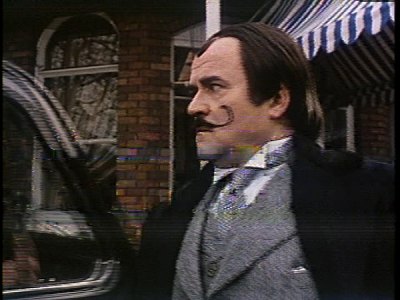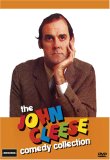| Reviews & Columns |
|
Reviews DVD TV on DVD Blu-ray 4K UHD International DVDs In Theaters Reviews by Studio Video Games Features Collector Series DVDs Easter Egg Database Interviews DVD Talk Radio Feature Articles Columns Anime Talk DVD Savant Horror DVDs The M.O.D. Squad Art House HD Talk Silent DVD
|
DVD Talk Forum |
|
|
| Resources |
|
DVD Price Search Customer Service #'s RCE Info Links |
|
Columns
|
|
|
John Cleese Comedy Collection
Kultur // Unrated // April 24, 2007
List Price: $29.99 [Buy now and save at Amazon]
 Back when he was cementing his status as a comic legend thanks to "Monty Python's Flying Circus" and "Fawlty Towers," John Cleese created a collection of television specials and short films, smallish one-off projects that offered an outlet for his ideas. White Star has collected three such projects in "The John Cleese Comedy Collection."
Back when he was cementing his status as a comic legend thanks to "Monty Python's Flying Circus" and "Fawlty Towers," John Cleese created a collection of television specials and short films, smallish one-off projects that offered an outlet for his ideas. White Star has collected three such projects in "The John Cleese Comedy Collection."Somewhere in between Cleese's work on the 1960s sketchcom series "The Frost Report" and "At Last the 1948 Show" and his star-making Python tenure, Cleese and Graham Chapman (with an assist by Marty Feldman and Tim Brooke-Taylor!) co-wrote a hit-and-miss assortment of comic sketches, hosted by Cleese under the educational banner "How to Irritate People" (1968).
The idea is simple: Cleese, addressing the camera with a pointedly silly matter-of-fact attitude, informs us that all those people in the world who annoy us do so on purpose. Here, then, is our guide to recognizing such folks and, more importantly, how to become one ourselves.
But what begins as a straightforward how-to guide quickly slips into a more anything-goes approach; one gets the sense that Cleese and Chapman wrote a bunch of skits, discovered a common thread in some of them, and whipped up the hosting bits as a way of tying it all together. Most of the sketches work, although only a few manage to work all the way through, the rest coming off like those dreaded "Saturday Night Live" skits that don't quite know when to end.
Of course, even when things fizzle, there's always a spark of a comic idea somewhere within, and when, say, a parody of cheesy TV hosting plods along past its welcome, at least you're smiling at the ideas behind the joke. Better are the sketches that wrap up on time, like the one involving the bored airline pilots who prank the passengers with a fake disaster, or the bit about the old ladies who ruin movies.
What we can see in "How to Irritate People" is the germ of bigger, wilder ideas that Cleese, Chapman, and co-star Michael Palin would later take to Monty Python. (Indeed, the salesman sketch seen here provides the seed for their classic "Dead Parrot" skit.) Watching this television special is like encountering demos of early day Beatles or the rough early films of Hitchcock - this is a legend working with training wheels. We can see where he'll be going, but he's not quite there yet.
 Shortly after taking leave of the Pythons, Cleese teamed with wife Connie Booth to write "Romance with a Double Bass" (1974) a short film adapted from a short story by Anton Chekov. Such a pedigree suggests a more upscale Cleese, but consider the plot: a musician (Cleese) and a princess (Booth) have their clothes stolen while pausing for a swim, then must somehow return to the castle in the all-together.
Shortly after taking leave of the Pythons, Cleese teamed with wife Connie Booth to write "Romance with a Double Bass" (1974) a short film adapted from a short story by Anton Chekov. Such a pedigree suggests a more upscale Cleese, but consider the plot: a musician (Cleese) and a princess (Booth) have their clothes stolen while pausing for a swim, then must somehow return to the castle in the all-together.Directed by Robert Young (who would later go on to helm the Cleese-penned "Fierce Creatures"), "Double Bass" is a wonderful, sweet, and often riotous celebration of life, with Cleese's gentle musician doing anything to uphold the honor of Booth's sorrowful damsel. Filmed on a shoestring, the short offers glances of gorgeous countrysides and lush manor interiors alongside the playful physical comedy and whimsical nature of the love story that unfolds with a smile. This is a quaint, lovely work.
The same cannot be said of "The Strange Case of the End of Civilisation As We Know It" (1977), a muddled attempt to parody a wide variety of mystery-adventure clichés. Cleese, who co-wrote with Jack Hobbs and Joseph McGrath, stars as the grandson of Sherlock Holmes, who spends his days with the grandson of Dr. Watson (Arthur Lowe). A descendant of Moriarty is killing off world leaders and announces the world has only a few days left in existence. The hotheaded Holmes and the moronic Watson are on the case!
There are, of course, plenty of delightfully kooky moments throughout, and plenty of one-liners zing (I'm a sucker for the "elementary, my dear Watson" puns that fill one scene), but overall, the project's a dreadful mess that at a meager 55 minutes still feels too long. We bounce from plot point to plot point with no real rhythm, as if we're watching less a full story and more a random assortment of comic ideas hastily glued together. By the time the show drags in a group of second-rate impressionists to goof on Columbo, Poirot, and Bogart, we're too tired at all the jokes that fail to truly laugh at the ones that succeed.
The DVD
White Star has released all three programs on DVD before, but instead of squeezing them onto one or two discs for this re-release (the combined running time for the projects is 160 minutes), we simply get the older discs bundled in a crummy cardboard slipsleeve.
Video & Audio
 These shows may be rarities, but that still doesn't excuse the awful presentations White Star gives them here. All three seem taken from old VHS transfers, assuming those VHS tapes were heavily damaged. You can easily spot videotape damage on two titles ("Double Bass" and "Civilisation"); you'll do a double take when you stumble upon VHS distortion in this digital age. "How to Irritate People" was shot on the cheap and looks it, with a bland video look. "Civilisation" and "Double Bass," shot on film, come to us smothered in dirt, scratches, and other print damage (which makes the video distortion in one shot look even more bizarre), with the print used for "Double Bass" looking notably worn and washed out. All three titles are presented in their original 1.33:1 broadcast formats.
These shows may be rarities, but that still doesn't excuse the awful presentations White Star gives them here. All three seem taken from old VHS transfers, assuming those VHS tapes were heavily damaged. You can easily spot videotape damage on two titles ("Double Bass" and "Civilisation"); you'll do a double take when you stumble upon VHS distortion in this digital age. "How to Irritate People" was shot on the cheap and looks it, with a bland video look. "Civilisation" and "Double Bass," shot on film, come to us smothered in dirt, scratches, and other print damage (which makes the video distortion in one shot look even more bizarre), with the print used for "Double Bass" looking notably worn and washed out. All three titles are presented in their original 1.33:1 broadcast formats.Sound-wise, we're still in a pickle, although the cheap mono presentations are stuck with lousy source material - I doubt "Civilisation" ever sounded good, as there are several moments where someone would turn away from the microphone, only to disappear into a muffle. Mercifully, "Double Bass," with its emphasis on classical music, sounds rather fine. No subtitles are provided.
In other words, watching all three is like watching these titles the way White Star released them long ago, on VHS recorded in EP. Yikes.
Extras
On "How to Irritate People," we're offered an outdated biography and filmography of John Cleese (whose last movie, according to this disc, was "Rat Race").
Final Thoughts
If you're a Cleese completist, you probably already have these bargain-bin discs from their earlier releases. If not, a rental might satisfy your curiosity, but even that's a stretch, considering the horrible transfers used here. Skip It, and hold off for the slim hope that these projects (especially the lovely "Double Bass") will somehow be salvaged in the future.
|
| Popular Reviews |
| Sponsored Links |
|
|
| Sponsored Links |
|
|
| Release List | Reviews | Shop | Newsletter | Forum | DVD Giveaways | Blu-Ray | Advertise |
|
Copyright 2024 DVDTalk.com All Rights Reserved. Legal Info, Privacy Policy, Terms of Use,
Manage Preferences,
Your Privacy Choices | |||||||













